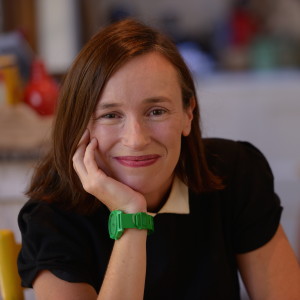Best-selling author Nikki Gemmell may have travelled a long way from her childhood home near Mt Keira but, she tells KYLIE MATTHEWS, the Gong will always sing her back.
First published in The Illawarra Mercury on June 28, 2014.
Nikki Gemmell has achieved some remarkable career peaks for someone so young.
At just 47, she has an internationally successful career as a broadcast
journalist under her belt, an influential gig as a weekly national newspaper columnist and is the author of nine acclaimed books, including the worldwide sensation The Bride Stripped Bare.
But despite all her success, this mother of four remains surprisingly grounded; she truly is one of the most humble and generous souls you could meet.
Her roots remain deeply engrained in the foothills of Mt Keira, which she says backed onto her childhood home. It is the landscape she credits for shaping her young self into the person and writer she is today.
‘That dramatic rush of the bush to the crashing sea; the old cottages … My dad worked in mining during my years as a kid in Wollongong, so it was a big part of my life.’
“We had the bush as our backyard and that kind of entered my blood and my bones,” she says. “I remember a red-bellied black snake in the gutter and a funnel web in the pool; ticks, endlessly, on the dog.
“I learnt to swim at the Wollongong baths and my dad was a lifesaver at Austinmer.
See your ad here
“I remember roller skating at Thirroul and also going to see Mario Milano wrestling there (I had two older brothers!).
“I loved going to the old Regent Cinema in Keira Street and I did verse speaking classes with the legendary Sally Carr up at Mt Keira — it stood me in good stead as a Triple J newsreader all those years later.”
On Saturdays, her parents sometimes took her to the big brown library on Crown Street, where she would lose herself for hours in books like Anne of Green Gables, Little House on the Prairie, The Silver Brumby series and Little Women. It was as a nine-year-old at Keiraville Public School that Gemmell first made the realisation she wanted to be a writer.
“The school magazine, the gloriously named Keiraville Kookaburra, published my very first piece of writing. The joy and wonder of that made me want to be a ‘proper’ writer one day,” she reveals.
Gemmell says she treasures her memories of Keiraville Public School.
“My teacher in years 5 and 6, Mr Rice, was inspirational. I’m very grateful to him because he encouraged my love of reading and urged me to write,” she recalls. “He also used to talk about Coddington’s Bookshop, sadly no longer there but a ‘Gong institution on Crown Street – I used to beg my parents to take me to it.”
Nikki left Wollongong towards the end of year 6 and moved to Sydney, where she attended Kincoppal in Rose Bay. It was in English class at Kincoppal that she says she became practiced at noting down her daily observations and inspirations, which later inspired her writing.
“That was a habit that began at school. One of my wonderful English teachers, when we were 14, she handed out all these blank, lined notebooks and she said, ‘Right girls, these are your journals, you’ve got to write in them every day and I’ll be collecting them every Friday’,” she says.
“She started a habit for me. And that journal, I’ve still got it – I’m up to journal number 17 now. They’re not like a diary, they’re more like notebooks. They record conversation scraps or a paragraph from a newspaper article, potential novel titles, a description of the sky or a storm.
“When I write my fiction, I go back and I mine my journals because they’re rich with quotes and material.”
After graduating from high school, Nikki went on to do a communications degree at the University of Technology in Sydney.
“All through that time, I was writing short stories – that was like my apprenticeship. And I was getting short stories published in various literary journals,” she says.
Nikki was offered a cadetship at ABC Radio and went on to become a successful broadcast journalist. Her work took her to places such as Alice Springs, Darwin, Antarctica and England – and always during her travels, she had her writer’s notebook close to hand.
The landscapes she visited during this time were her inspiration to write her first three novels – Shiver (set in Antarctica), Cleave (set in the Illawarra and Alice Springs) and Love Song (set in England).
“[My work] has taken me to a lot of places, I’ve meet amazing people and always I’ve had my writer’s notebooks by my side,” she says.
In her third novel, Cleave, Gemmell says she was heavily influenced by the landscape of her childhood.
“In this book, I write a lot about the Illawarra escarpment, the old coalmining villages like Coalcliff, Wombarra, Thirroul,” she says.
“That dramatic rush of the bush to the crashing sea; the old cottages … My dad worked in mining during my years as a kid in Wollongong, so it was a big part of my life.”
Like thousands of young Australians of her generation, she moved to London to live, settling in the bustling village of Notting Hill. She worked for the BBC World Service, married her Australian husband and gave birth to three of her four children.
It was also in London that she wrote her explosive fourth book The Bride Stripped Bare, which caused significant controversy and forever changed the way women’s sexuality is represented in mainstream fiction.
It achieved international success, catapulting Gemmell into the spotlight and heralding her as an exciting and fresh voice in literary fiction.
After 14 years in London, Nikki and her husband made the difficult decision to up stumps and return to Australia.
“Our eldest son was starting to look towards high school and we had to go before then because if he went to high school in England, he would be a Brit and our other kids would follow and be Brits and we’d end up staying for good.” Making the decision to return to Australia wasn’t an easy one.
Gemmell recorded this very personal journey of her family’s choice to return in her 2009 book Why You Are Australian.
“There’s one thing I have here that I never had in London, which is a quietness of the soul. I feel like I’m home. And I’m settled. I’ve never had that before,” she says.
“I’ve been a gypsy wanderer for so long and I just want to get back to the known now and I feel there’s a great comfort in that. I also think it’s very much to do with … home. And that sense of where we were raised and the quality of light that is in our bones; that will sing us back,” she says.
“Now I’m home and I feel deeply comfortable and I don’t hanker for anything else.”
© 2014 FAIRFAX
